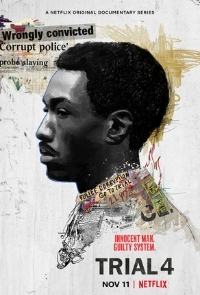
Trial 4
Directed by: Rémy Burkel
Reviewed by: Brad Williamson
Genre: Biography / Documentary
Score: 4/5
Netflix produces a wide variety of entertainment, but crime documentaries are definitely their wheelhouse. Between Making a Murderer and Tiger King, they’ve made a killing on this formulaic approach. Trial 4, however, is neither of these. It lacks the outrageous personas of the latter and is far less tense and dramatic than the former. Instead, it is something new; it’s a direct, plain-clothed, unabashed assault on corruption that shares more in common with Michael Moore than a traditional, multi-faceted Netflix documentary.
One thing a lot of viewers might dislike about this documentary is that it blatantly attacks the police corruption, giving no hint that Sean Ellis might actually be guilty. This is also the detail I most enjoyed while watching Trial 4. Sometimes you don’t need to hear both sides of the story–sometimes one side tells everything clearly enough. With this axiom, the show goes on to incriminate, blame, oust, and attack with all its resources not only dirty cops, but the entire Boston Police Department, and, basically, the broader issue of rampant racism that fuels policing throughout the entire United States. It gives no measure of respect or disrespect to fallen officers, only the truth; it functions not on political correctness but instead on displaying for all who care to watch and listen the tragic misappropriation of justice, power, and influence that was so normal in the 80s and early-90s, and continues to worsen despite increased awareness.
The show voices this message clearly and confidently. The people who refused to participate compared to those who were willing to go on record says more than much of what was actually put to film. We see much of Sean Ellis throughout the entire documentary, of course, but the star of the mini-series is most definitely his attorney, Rosemary Scapicchio. The story behind how she came to take his case, the fervor with which she defends Sean, her confidence and skill, all of this is fantastic as her personality bleeds forth from the television screen. She wasn’t acting in this–I don’t think she was at least–but after watching the show, I would cast her in any upcoming film. She has a rare charisma that is unbelievable and captivating to watch.
But might people claim this very charm is what makes Sean seem so innocent? And the answer to this is, no, definitely not. The evidence, circumstances, testimony, and history of the case all go toward this end, but without Rosemary it’s possible he might still be in prison. This is the most important thing to glean from Trial 4, that it took numerous trials, proof of witness tampering, suspicious circumstances, faulty testimony, multiple hung juries, a Spotlight attack on the entire police force, and much, much more just to give Sean a chance at freedom. That’s how unfair the system is right now, and this is what Trial 4 wants to trumpet.
It might be a bit too long for its own good, maybe could have been two fewer episodes, but nearly everything about the show was well made and enlightening. It won’t have the humor or tension you might be expecting, but it will infuriate you, which is precisely its purpose. And for that I feel confident in recommending this to just about everyone.
Recent Comments